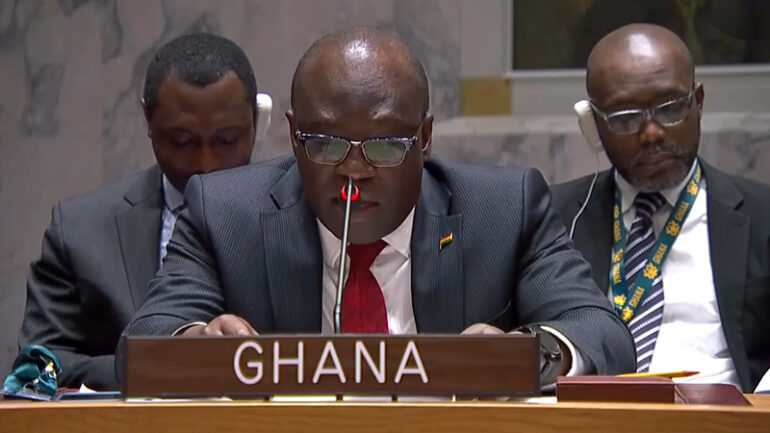Briefing and Consultations on the situation in the Middle East, Including the Palestinian

UNITED NATIONS SECURITY COUNCIL BRIEFING AND CONSULTATIONS ON THE SITUATION IN THE MIDDLE EAST-THE QUESTION OF PALESTINE
Mr. President,
Let me begin by thanking the delegation of the United Arab Emirates for requesting this meeting on “The situation in the Middle East, including on the question of Palestine”, and ASG Khaled for his briefing to the Council. Undoubtedly, the situation in the Middle East, which has been on the agenda of this Council for more than seven (7) decades, is a difficult dispute by any measure. Unlike many other conflicts, the passage of time has not made it any easier for the international community to resolve the dispute. Rather, dayby-day, we seem to be drifting further away from our
envisaged goal. Nonetheless, the creation of the State of Israel by the mandate of this body and the anticipated establishment of the State of Palestine are sacred trusts that must be carried through. It is in this regard, that we deem it important that this Council always act as an enabler for the Middle East Peace Process, by bringing the parties on track when they veer off and encouraging their efforts when it serves the cause of peace.
Mr. President,
Ghana has followed closely the recent events in Jerusalem that have provoked this meeting. The unscheduled visit by the National Security Minister of Israel to the holy site of the Al Aqsa Mosque or the Temple Mount on 3rd January has regrettably created renewed tensions in the Middle East. Jerusalem is supposed to be place of peace, and, indeed, its holy sites are of significance to Christians, Jews, and Muslims alike. While urging religious tolerance and peaceful coexistence, we note with concern the confrontations and violent clashes that preceded and took place after the Israeli Minister’s visit, We therefore welcome the fact that both the Prime Minister and the Foreign Minister of Israel have clarified their government’s position that there has not been any policy
change in relation to the holy sites of Jerusalem. We believe this is an important gesture by the new Israeli government and urge consistency in maintaining the status quo ante. The renewed tension in the Middle East is however more than the manifestations of the recent incidents. It reflects decades of actions that have created mistrust on both sides.
We therefore urge the parties to carefully constrain the flourishes of unilateral actions that can deepen suspicion and create conditions for those who do not seek peace on both sides to
destroy the confidence that is required for dialogue and genuine engagement. In this new year of hope, we urge Israel and Palestine to engage constructively to address the security concerns of Israel and the inalienable rights of the Palestinian people. This is important if the collective aspiration of this Council, neighboring countries, as well as the international community is to be realized. On our part, Ghana would continue to encourage the parties to seek the narrow and difficult path of peace through a renewed and constructive dialogue on a political horizon. We would continue to urge the parties to resume direct negotiations for a comprehensive and lasting peace, in the spirit of cooperation and in good faith.
Finally, Ghana reaffirms her belief that lasting peace and stability in the Middle East is possible, through the two-State solution, with Israel and Palestine living side by side, within
secure and recognized borders, on the basis of the 1967 borders, with East Jerusalem as the capital of the Palestinian State.
